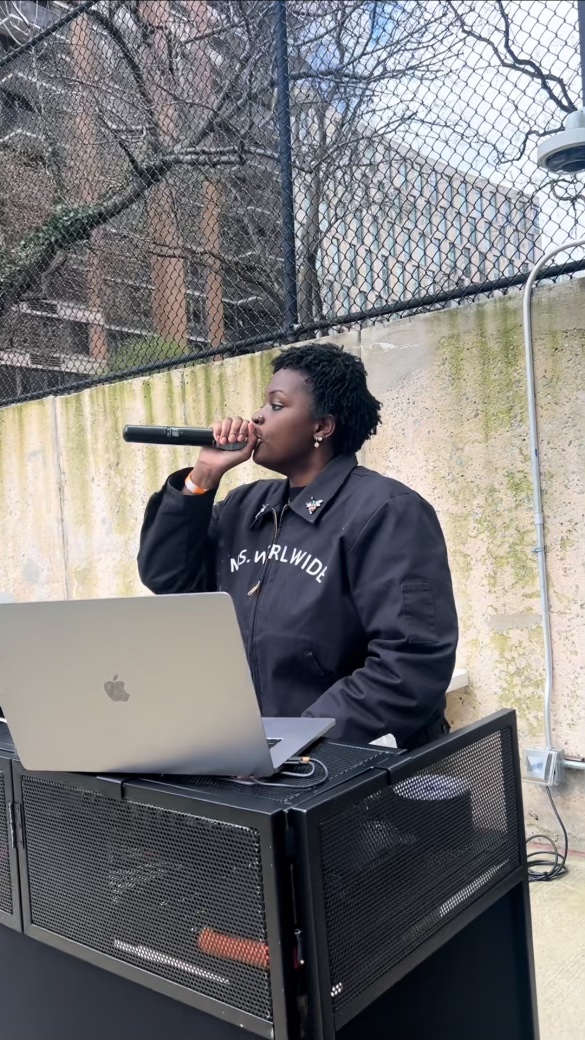The Black Student Alliance (BSA), the Caribbean Students Club (CSC) and the Student Organization for Latines (SOL) collaborated to host an event titled “The Family Reunion” on Saturday, April 6. The event was intended to be a celebration of the clubs’ cultures. It was interrupted when police arrived on the scene.
BSA President Kennedi Hutchins, Fordham College at Lincoln Center (FCLC) ’25, said the event, which featured lawn games, food and a DJ on the McMahon Lawn, was off to a good start despite cold weather.
But the event would soon face interference. Makayla Fredericks, FCLC ’26 and president of CSC, stated that Public Safety arrived about an hour into the event to warn that several noise complaints had been made against them.
“It was three o’clock in the afternoon on private property, so I wasn’t expecting any issues,” Fredericks said. “That’s normally a fine time to have loud music.”
According to Robert Dineen, assistant vice president for public safety, his office received several complaints from a resident of a private building adjacent to the McMahon Lawn at around 2:30 p.m. In a comment to The Observer, Dineen stated that public safety supervisors responded to the complaint and determined the volume of the music was at a “reasonable level.”
The public safety officers spoke with the events managers, students working for the Office of Student Involvement (OSI). Fredericks said the event managers told her to lower the volume of the music “a few notches” and the students complied. Dineen confirmed that students lowered the music in good faith.
Dineen said that around 4 p.m., the NYPD appeared and spoke to students through the West 61st Street cul-de-sac lawn gate, alerting the students of a series of noise complaints they received. NYPD told students that the music was too loud and to continue playing music they would need a sound permit.
Dineen commented that while neighborhood residents have made noise complaints in the past, they are “very rare.”
“If this ‘noise’ was an issue, Fordham should not allow students to have events there because they are putting them at risk of interacting with the police that could lead to a pretty intense escalation.” Makayla Fredericks, FCLC ’26
Fredericks and Hutchins were confused as they had complied with Public Safety’s initial request to turn the music down. Dineen said that Public Safety was not aware of the conversation between NYPD and students until after the interaction.
The police left soon after as the event was nearing its end, but the interaction didn’t sit right with Fredericks. She said that she had never heard of police being called on students and felt it was odd that they were interacting with the students on private property.
“If this ‘noise’ was an issue, Fordham should not allow students to have events there because they are putting them at risk of interacting with the police that could lead to a pretty intense escalation,” Fredericks said.
Fredericks said she believed the police were called because of the race of the attendees.
“We were playing ‘cultural’ or stereotypical Black and Hispanic music,” Fredericks said. “It is clear that they knew the type of people in that lawn.”
Hutchins criticized the noise complaints, saying the police and public safety response was far greater at the cookout than at the “Ravelengths” event featuring live music by alternative band “Laundry Day” on April 12
Public Safety responds to all notifications they receive from police officers concerning Fordham campuses. If alerted by the police of a complaint made by an off-campus party, public safety officers will directly address the individuals involved in the report received in order to reconcile the issue at hand.
Hutchins criticized the noise complaints, saying the police and public safety response was far greater at the cookout than at the “Ravelengths” event featuring live music by alternative band “Laundry Day” on April 12. Dineen said NYPD officers responded to noise complaints at the event but “just left” before Public Safety officers arrived.
“It was much louder, way higher attendance, later at night,” Hutchins said. “It’s just kind of frustrating. When there’s events happening at the same place, same time, same area … I guess people interpreted that was different given that we were majority students of color on campus as opposed to the other event.”
Fredericks further voiced her disapproval with the university and shared that nobody from Fordham’s administration, Public Safety, or OSI had reached out to offer support or get more of an understanding of what happened the afternoon of the event.
“This situation made me understand even further that Fordham does not have my back and won’t create these spaces for people like me and I have to create them. But even then I am receiving pushback when we’ve done nothing wrong. Student events on private campuses should not be shut down by the NYPD and now I’m worried about this happening in future events. ”
Fredericks stated this will not stop these student organizations from having more events in the future. On April 27, CSC hosted the first ever crossover event with Rose Hill’s Caribbean and African Student Association. This event was a cultural fashion event showcasing young stylists and designers of African and Caribbean descent in New York City.

